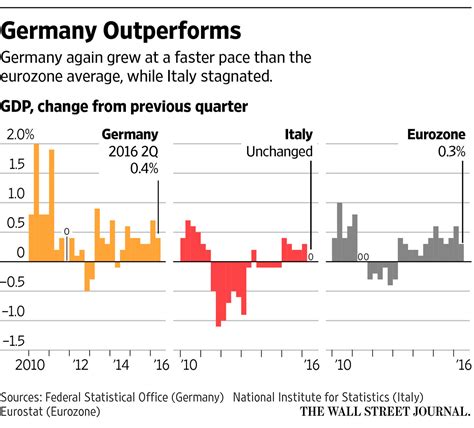In the grand tapestry of Europe, an intriguing phenomenon has been unfolding – a tale of two halves diverging in economic fortunes. The traditional powerhouses of the north, known for their industrial might and financial prowess, are facing stagnation and challenges, while the southern nations once plagued by economic woes are now experiencing a renaissance.
The Changing Landscape
The winds of change have swept across Europe, reshaping its economic landscape in unexpected ways. Countries like Germany, Sweden, and the Netherlands that were long regarded as pillars of stability are now grappling with sluggish growth rates and structural issues. On the other hand, countries such as Spain, Portugal, and Greece have emerged from the shadows of recession to showcase impressive growth trajectories.
Expert Analysis
According to leading economists, this reversal of fortunes can be attributed to a myriad of factors. The global financial crisis that struck in 2008 acted as a catalyst for change, exposing vulnerabilities in the northern economies while paving the way for much-needed reforms in the south. Southern countries embarked on ambitious austerity measures and structural reforms that bore fruit over time.
A Tale of Resilience
The southern European nations demonstrated remarkable resilience in the face of adversity. Through painful yet necessary reforms encompassing labor market flexibility, pension system overhauls, and improved tax collection mechanisms, these countries laid down a foundation for sustainable growth. The entrepreneurial spirit that runs deep within Mediterranean cultures also played a pivotal role in driving innovation and attracting investments.
Northern Challenges
Conversely, northern European economies faced hurdles in adapting to changing global dynamics. Traditional industries struggled to stay competitive amidst rising automation and evolving consumer preferences. Moreover, an aging population posed significant challenges to welfare systems designed during more prosperous times. These factors compounded to create a perfect storm of economic slowdown.
Implications for Europe
The contrasting trajectories of northern and southern Europe carry profound implications for the continent as a whole. As traditional powerhouses falter and newer players ascend on the economic stage, there is a shift in geopolitical dynamics within Europe. This rebalancing could potentially lead to greater collaboration among EU member states as they navigate this new reality together.
The Road Ahead
Looking ahead, both northern and southern Europe face unique sets of opportunities and challenges. Northern countries must embrace innovation-driven growth models while addressing demographic concerns through targeted policies. Southern nations need to consolidate their gains by fostering sustainable development strategies that promote inclusive growth and address income inequality.
As Europe continues on this transformative journey marked by diverging economic paths between its north and south regions,
the lessons learned from this paradigm shift will shape policies,
foster cross-border collaborations,
and redefine traditional notions of prosperity on the continent.









Leave feedback about this